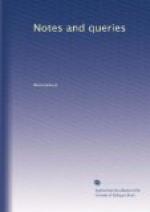* * * * *
Macaulay’s Hist. of England (1st ed.), ii. 476:—
“But the iron stoicism of William never gave way: and he stood among his weeping friends calm and austere, as if he had been about to leave them only for a short visit to his hunting-grounds at Loo.”
“... non aliter tamen
Dimovit obstantes propinquos,
Et populum reditus
morantem,
Quam si clientum longa negotia
Dijudicata lite relinqueret,
Tendens Venafranos in agros,
Aut Lacedaemonium
Tarentum.”
Hor. Od. iii. v. 50-56.
* * * * *
“De meretrice puta quod sit sua
filia puta,
Nam sequitur leviter filia
matris iter.”
These lines are said by Menage (Menagiana, Amstm. 1713. 18mo., iii. 12mo.) to exist in a Commentary “In composita verborum Joannis de Galandia.”
F.C.B.
* * * * *
WILLIAM BASSE AND HIS POEMS.
Your correspondent, the Rev. T. Corser, in his note on William Basse, says, that he has been informed that there are, in Winchester College Library, in a 4to. volume, some poems of that writer. I have the pleasure of assuring him that his information is correct, and that they are the “Three Pastoral Elegies” mentioned by Ritson. The title-page runs thus:—
“Three Pastoral Elegies of Anander, Anetor, and Muridella, by William Bas. Printed by V.S. for J.B., and are to be sold at his shop in Fleet Street, at the sign of the Great Turk’s Head, 1602.”
Then follows a dedication, “To the Honourable {349} and Virtuous Lady, the Lady Tasburgh;” from which dedication it appears that these Pastoral Elegies were among the early efforts of his Muse. The author, after making excuses for not having repaid her Ladyship’s encouragement earlier, says,—
“Finding my abilitie too little to make the meanest satisfaction of so great a principall as is due to so many favourable curtesies, I am bold to tende your Ladyship this unworthy interest, wherewithal I will put in good securitie, that as soone as time shall relieve the necessitie of my young invention, I will disburse my Muse to the uttermost mite of my power, to make some more acceptable composition with your bounty. In the mean space, living without hope to be ever sufficient inough to yeeld your worthinesse the smallest halfe of your due, I doe only desire to leave your ladyship in assurance—
“That when increase of age
and learning sets
My mind in wealthi’r state than now it is,
I’ll pay a greater portion of my debts,
Or mortgage you a better Muse than this;
Till then, no kinde forbearance is amisse,
While, though I owe more than I can make good,
This is inough, to shew how faine I woo’d,
Your Ladyship’s in all humblenes
“WILLUM BAS.”




